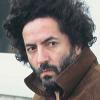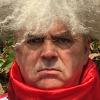Curtis Harding Brings Soul Power to Athens
Friday, Oct. 3 @ Georgia Theatre

Photo Credit: Hedi Slimane
The sideman steps out. It’s a well-worn trope in pop music. One iteration of this narrative tends to portray the artist’s time near the spotlight—"20 feet from stardom," as the recent documentary about backup singers like Darlene Love and Merry Clayton would have it—as a period of apprenticeship, an experience valuable more for its professional benefits than for the influence it has on the artist’s aesthetic. That is, you learn what you can as a sideman, but once you’ve gone solo, you make your own sound; all the time you spent backing others becomes little more than an interesting footnote.
The case of Atlanta’s Curtis Harding is far more dynamic. Harding is a former backup singer and co-songwriter for CeeLo Green and performs in the garage soul band Night Sun with Cole Alexander of Black Lips. His debut solo album, Soul Power, not only bears witness to his unique talents; it also speaks in concert with the music of his past collaborators, offering the chance to view him in a broader context, just as a listener hearing A Love Supreme might think of a younger Coltrane playing sax in the Miles Davis Quintet.
For Harding, assuming the role of frontman doesn’t mean putting an end to collaboration. One particularly fruitful instance of this on Soul Power is “I Don’t Want to Go Home.” The song, co-written with Black Lips’ Jared Swilley, also appears on that band’s latest album, Underneath the Rainbow. As Harding tries to talk his way into spending the night with someone, the music stays almost comically upbeat, bouncy drums and a jaunty bass bobbing along like grinning wingmen.
Speaking with Flagpole, Harding describes the song's message as a kind of waggish Realpolitik for late-night hook-ups, the singer “trying to convince the girl that it’s in both of [their] best interests to see the night through.”
Harding shares writing credits on many of Soul Power's tracks. The record's broad range of styles speaks to a broadminded approach; for his part, Harding seems refreshingly open to others’ input. “For me, there is no one way to collaborate,” says Harding. “It depends on where you are, who you’re with and what you have to work with.”
Atlanta, to me, has always been a place where people from different bands and genres find themselves in each other's company.
Single “Keep on Shining” features lyrics by Harding and music by Randy Michael. The track boasts a meticulous arrangement, layers of pristine guitars and a quietly soaring horn line in the chorus. Harding delivers the vocal melody with just enough presence to give the song focus, while leaving room for each of the other parts to shine through. This sense of balance is present throughout Soul Power.
Harding has described his sound as “sloppin’ soul,” a tag that captures the music's soulful roots and its ability to absorb many disparate influences. Atlanta’s diverse music scene has played a significant role in helping Harding craft this sound.
“Music is meant to be shared,” he says. “It only makes sense that collaborations between confident artists take place. Atlanta, to me, has always been a place where people from different bands and genres find themselves in each other's company. I personally have always searched for the other.”
All the markings of classic soul are present on album standout "Heaven’s on the Other Side": bright guitar chords strummed high up on the neck, fluid horns, sweet, distant strings drifting through the mix. That all of this is laid down over a four-on-the-floor disco beat, replete with handclaps on the chorus, only enhances the effect.
The track is a pleasantly jarring change from what immediately precedes it. “The Drive” is dominated by a propulsive drumbeat. Mournful horn lines float atop the churning rhythm only to fade away, their pitch synthetically downshifted. There's a space-age synth—think “Fly Like an Eagle” by the Steve Miller Band—that occasionally comes swooping in. Somehow, it all comes together.
The wide array of sounds on Soul Power leaves many possibilities for Harding's live show. Should we expect a raucous, Black Lips-style garage band blasting the fuzz bass on “Surf”? Or a more straight-laced ensemble, a rock-solid organist laying down chords and a tight horn section nailing its parts?
Harding is coy on the subject—“I'd rather surprise you” is all he'll say—but, no matter what kind of group he has backing him, both the new album and his past collaborations speak in his favor. If nothing else, Harding keeps good company.
WHO: Lee Fields and the Expressions, Curtis Harding
WHERE: Georgia Theatre
WHEN: Friday, Oct. 3, 7:30 p.m.
HOW MUCH: $15
More by Marshall Yarbrough
-

Destroyer's Dan Bejar Tackles the Myth of the Singer-Songwriter
Tuesday, Oct. 4 @ Caledonia Lounge
-

Quilt, Mutual Benefit, Juan de Fuca
Friday, Sept. 9 @ Caledonia Lounge
-

Why the Melvins Will Outlive Us All
Monday, Sept. 5 @ 40 Watt Club









comments